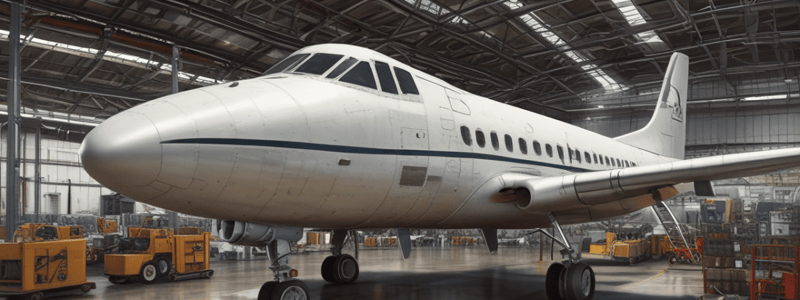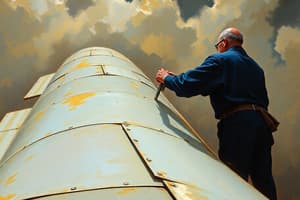Podcast
Questions and Answers
What should be checked when inspecting a pressurised structure?
What should be checked when inspecting a pressurised structure?
- Only the functionality of blow-out panels
- Only the airframe symmetry
- Subtle changes to the skin surface and constant cyclic loading (correct)
- Only visible defects on the skin surface
Why is it essential to inspect for corrosion when removing skin panels?
Why is it essential to inspect for corrosion when removing skin panels?
- To detect hidden defects in the underlying structure (correct)
- To ensure airframe symmetry
- To inspect for subtle changes to the skin surface
- To check for fatigue cracks around doors
What is the significance of inspecting blade seals?
What is the significance of inspecting blade seals?
- They increase fuel consumption
- They are not essential for aircraft performance
- They affect flight characteristics
- Their condition is critical to aircraft serviceability (correct)
Why is aerodynamic cleanliness important?
Why is aerodynamic cleanliness important?
What should be inspected to ensure airframe symmetry?
What should be inspected to ensure airframe symmetry?
What should be checked when inspecting moving parts?
What should be checked when inspecting moving parts?
What is typically inspected for in rubber, fabric, glass fibre, and plastic parts?
What is typically inspected for in rubber, fabric, glass fibre, and plastic parts?
What is a characteristic of deterioration in rubber, fabric, glass fibre, and plastic parts?
What is a characteristic of deterioration in rubber, fabric, glass fibre, and plastic parts?
What is inspected for in control system component defects?
What is inspected for in control system component defects?
What is an example of a glass defect?
What is an example of a glass defect?
What is inspected for in rubber, fabric, glass fibre, and plastic parts?
What is inspected for in rubber, fabric, glass fibre, and plastic parts?
What is a characteristic of control system component defects?
What is a characteristic of control system component defects?
What is the purpose of small white marks on the wheel rim and tyre side wall?
What is the purpose of small white marks on the wheel rim and tyre side wall?
What is a common cause of defects in aircraft wheels?
What is a common cause of defects in aircraft wheels?
What happens to the brake rotors and stators during operation?
What happens to the brake rotors and stators during operation?
How is wear on the brake pack typically monitored?
How is wear on the brake pack typically monitored?
What is a sign of excessive heating of the brake unit?
What is a sign of excessive heating of the brake unit?
When are landing gear locks typically fitted to the aircraft?
When are landing gear locks typically fitted to the aircraft?
What should be inspected on aircraft fittings like nuts and bolts?
What should be inspected on aircraft fittings like nuts and bolts?
What should be done to rivets during inspection?
What should be done to rivets during inspection?
What should be checked on filters, screens, and aircraft fluids during inspection?
What should be checked on filters, screens, and aircraft fluids during inspection?
Why should a gap under the rivet head be inspected?
Why should a gap under the rivet head be inspected?
What should be checked on engine nacelles during inspection?
What should be checked on engine nacelles during inspection?
What should be checked on wiring during inspection?
What should be checked on wiring during inspection?
What is the primary method of neutralizing alkali spillage?
What is the primary method of neutralizing alkali spillage?
What is the main concern when dealing with mercury spillage on aluminium alloys?
What is the main concern when dealing with mercury spillage on aluminium alloys?
Why is it essential to clean spilled mercury on aluminium immediately?
Why is it essential to clean spilled mercury on aluminium immediately?
What is a effective method of locating small particles of spilled mercury?
What is a effective method of locating small particles of spilled mercury?
Why is it important to isolate and recover mercury spills on an aircraft?
Why is it important to isolate and recover mercury spills on an aircraft?
What is a possible source of mercury spills on an aircraft?
What is a possible source of mercury spills on an aircraft?
Flashcards are hidden until you start studying
Study Notes
Rubber / Fabric / Glass Fibre / Plastic Part Defects
- Inspections of these parts include checking for cleanliness, cracks, cuts, chafing, kinking, twisting, crushing, and contraction or sufficient free length.
- Deterioration, crazing, loss of flexibility, overheating, fluid soakage, and security of attachment, correct connections, and locking are also inspected.
- Examples of defects include windscreen cracks.
Control System Component Defects
- Inspections of cables, chains, pulleys, rods, and tubes include checking for correct alignment, free movement, and no fouling or distortion.
- Evidence of wear, flattening, cracks, loose rivets, and deterioration of protective treatment are also inspected.
- Electrical bonding, correct positioning, and secure attachments are also checked.
Inspecting Wheels
- Defects in aircraft wheels are usually due to impact damage from heavy landings or items on the runway hitting the wheel rim.
- Corrosion can start as a result of impact damage and shearing of wheel bolts.
- Wheels are usually inspected thoroughly during tyre replacement.
Inspecting Brakes
- Brake units are attached to the axle of an undercarriage leg and absorb large amounts of energy as heat during operation.
- Inspection of brake units between flights is essential to check for signs of excessive heating and wear beyond limits.
- Wear reduces the total thickness of the brake pack, which can be monitored by measuring the thickness of the pack.
Inspecting Landing Gear Locks
- Landing gear locks are fitted to the aircraft's undercarriage as a safety device to prevent landing gear from inadvertently collapsing.
- They are usually fitted when the aircraft is to stay on the ground for some time and removed before the next flight.
Inspecting a Pressurised Structure
- Factors to consider when inspecting a pressurised structure include constant cyclic loading or hoop stress, subtle changes to the skin surface, and serviceability of blow-out panels, doors, windows, and seals.
- It is essential to check the surrounding area for damage that may not be apparent, such as in the underlying structure.
- Feel for deformation, such as wrinkles or buckling, and make measurements to ensure airframe symmetry.
Inspecting Moving Parts
- When inspecting moving parts, the AME must check that defects have not been created during component operation.
- There should be no evidence of wires or wire looms chafing or rubbing against other components or structures, burning or overheating, defective insulation, loose, corroded, or broken terminals, heat or fluid degradation, and proper installation of any clamps or devices supporting the wiring.
Inspecting Bolts
- Aircraft fittings like nuts and bolts should be checked to ensure they have the correct torque and that any tamper-proof paste is still intact.
- Any elongation of bearing surfaces, deformation, evidence of shear or tension damage should be identified and recorded.
- All fittings should be installed correctly, be the correct size and type, and be corrosion-free.
Inspecting Rivets
- Any corrosion discovered around rivets should be identified and recorded.
- A complete inspection requires them to be drilled out to determine the extent of any corrosion.
- The maintenance manual should always be followed when reinstalling rivets.
- An inspection should also identify if there is a gap under the rivet head or if it is loose.
Inspecting Filters, Screens, and Fluids
- Inspection of filters, screens, and aircraft fluids includes checking for cleanliness to ensure there is no contamination.
- These components should be checked to ensure they have been previously inspected and or replaced in accordance with the maintenance manual service schedule.
Inspecting the Powerplant
- When inspecting the engine nacelles, the engine mounts should be thoroughly inspected for security and any evidence of movement or wear, cracking or corrosion.
Corrosion Due to Mercury
- Spilled mercury on aluminum should be cleaned immediately because mercury causes corrosion attack, which is rapid in both pitting and intergranular attack.
- X-ray inspection may be an effective method of locating small particles of spilled mercury.
- The presence of mercury and mercury salts in air cargo is a definite possibility and requires immediate action for its isolation and recovery.
Studying That Suits You
Use AI to generate personalized quizzes and flashcards to suit your learning preferences.





